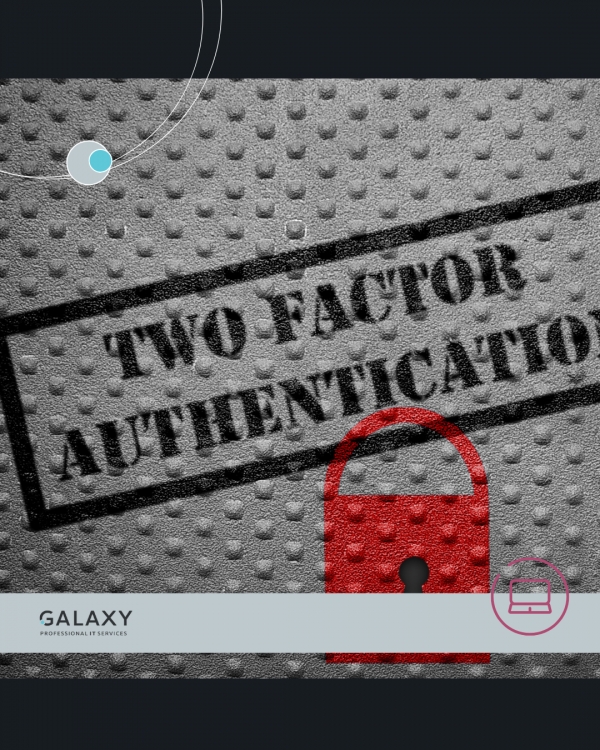Why Every Business Needs Multi-Factor Authentication (MFA)

Protecting Your Business in an Increasingly Digital World
Cyber threats are evolving at an alarming rate, and businesses of all sizes are at risk. Passwords alone are no longer enough to protect sensitive company data, financial records, and customer information.
Multi-Factor Authentication (MFA) has become one of the most effective ways to secure business accounts and reduce the risk of cyber attacks.
For businesses that store customer data, rely on cloud services, or process financial transactions, implementing MFA is no longer optional - it’s a necessity. In this article, we’ll explore why MFA is essential, how it works, and how Galaxy IT can help you implement it effectively in your business.
What is Multi-Factor Authentication (MFA)?
MFA is a security system that requires users to verify their identity using multiple forms of authentication before accessing an account or system. Instead of relying solely on a password, MFA adds additional security layers, making it much harder for hackers to gain unauthorised access.
MFA typically requires two or more of the following authentication factors:
- Something you know - a password, PIN, or security question
- Something you have - a one-time code sent to a mobile device, an authentication app, or a security key
- Something you are - biometrics such as fingerprint scanning or facial recognition
This means that even if a hacker steals a password, they still need another form of authentication to access an account, drastically reducing the chances of a successful cyber attack.
Why Every Business Needs MFA
1. Passwords alone are not enough
Studies show that 81% of hacking-related breaches are caused by stolen or weak passwords. Many employees reuse passwords across multiple accounts, making it easier for cybercriminals to exploit security gaps. Source: Verizon Data Breach Investigations Report (DBIR).
MFA adds an extra layer of protection, ensuring that even if login credentials are compromised, hackers can’t gain access without additional verification.
2. Prevents phishing and credential theft
Phishing attacks - where hackers trick employees into revealing login details - are one of the most common cyber threats. Even the most security-conscious employees can fall victim to a convincing fake email or website.
MFA prevents phishing-related breaches by requiring additional verification, such as a one-time code from an authentication app. Even if an employee unknowingly gives away their password, the attacker still won’t be able to log in without the second factor.
3. Reduces the risk of data breaches
A data breach can cost businesses thousands in fines, reputational damage, and lost productivity. Many cybercriminals target small and medium-sized businesses because they often lack advanced security measures.
MFA significantly reduces the risk of a breach by blocking unauthorised access to business applications, email accounts, and sensitive files - even if login credentials are stolen.
4. Compliance with security standards and regulations
Many industries now require MFA as part of regulatory compliance frameworks. If your business handles sensitive customer data, processes online payments, or operates in a regulated industry, failing to implement MFA could lead to compliance violations and legal risks.
For example, MFA is often required for:
- GDPR Compliance - Protecting customer data from unauthorised access.
- Cyber Essentials Certification - A UK government-backed security standard.
- ISO 27001 Information Security Management - A widely recognised security standard
If you need help ensuring your business meets security requirements, Galaxy IT can guide you through the process.
How MFA Works in a Business Setting
MFA can be implemented across various business applications, including:
- Email Accounts – Protecting access to Microsoft 365, Google Workspace, and other business email services.
- Cloud Storage & Collaboration Tools – Adding an extra security layer to OneDrive, Dropbox, Google Drive, and project management platforms.
- Remote Access & VPNs – Ensuring secure remote access for employees working from home or on the go.
- Financial & Payment Systems – Preventing unauthorised transactions in banking portals and accounting software.
The best way to implement MFA is through an authentication app (such as Microsoft Authenticator, Google Authenticator, or Duo Security), as these apps generate unique, time-sensitive codes that can’t be intercepted by hackers.
How Your Business Can Implement MFA Effectively
Setting up Multi-Factor Authentication (MFA) correctly is essential to improving security while keeping access simple for employees. Here’s how businesses can ensure a smooth implementation:
- Choose the Right MFA Method – Whether it’s app-based authentication or hardware security keys, selecting the right method matters.
- Set Clear Security Policies – Decide where MFA is required (email, cloud storage, admin accounts) and ensure employees understand when and how to use it.
- Educate Employees – Staff training is crucial to ensure MFA adoption and to prevent security mistakes like falling for MFA fatigue attacks.
- Regularly Monitor & Update Settings – MFA settings should be reviewed regularly to ensure they remain effective against evolving threats.
If you need help securing your business, visit our website to explore our IT security services and find out how we can support your business.
Let’s have a chat
about your IT
Book in a free 15 minute consultation
to find out how we can benefit you.



